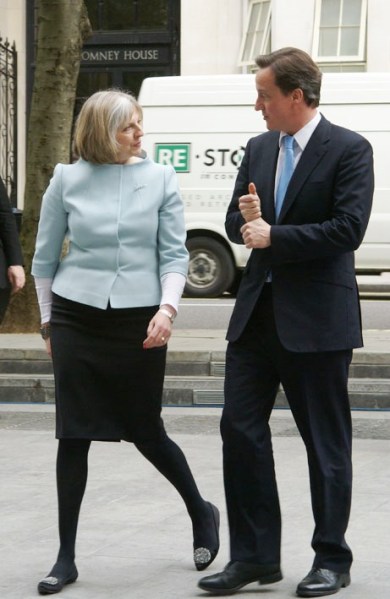Everyone always talks about how Benazir introduced us. As if she were the catalyst that ignited a fire destined to burn in our bellies as soon as our eyes locked. But it wasn’t like that at all. Especially not for Theresa.
I remember watching her on the dancefloor that night and thinking she moved a bit like a pump. Expanding and contracting, carving out her own space. Graceless but full of conviction.
She conjured associations I found reassuring. Girls playing tennis with their socks pulled up to their knees. Hymns in church. But also, a schoolboy’s desire to be put in his place.
She was holding a glass of orange juice when Benazir pulled her towards me and said: “Theresa, do you know Philip?”
“No.” Not a hint of expectation in her voice. Neither impressed nor disappointed by the sight of me. I felt immediately at ease.
“I suppose I quite liked him,” was what she told Kirsty Young on Desert Island Discs a few years ago. I had to laugh when I heard that. It was only marginally better than the truth: that I was neither especially desirable nor particularly objectionable.
But those traits stood to me. Theresa has always been a pragmatist. And I suppose she figured I was as good a catch as any other.
On our wedding day, I watched her tuck a blanket round her mother’s knees. She even insisted on pushing the chair from the church to the parish hall. She’d have made a good matron, if she wasn’t so clever.
Our early years together were shaped by her mother’s decline. At university, we would spend our Saturdays stuffing envelopes for the Conservative Association. In the evenings, we would drive down to her parents to deliver the beef casseroles she’d made the night before.
It seemed to me at the time that the prospect of her father being left alone was more painful to Theresa than her own grief.
But even in that regard, fate wasn’t kind to her. The more pragmatic she is, the more the universe conspires to smite her.
One evening, a year into our marriage, I came home from work and found the lights in the hallway off and the telephone hanging loose. Strange – Theresa was almost always home before me. Back then, the Bank of England wasn’t the tight ship it is now. I called her name but there was no reply.
I raced upstairs and found her on the bedroom floor, crouched in the fetal position.
I thought she’d been attacked. Violated. I looked stupidly at the bedroom window for signs of an attacker’s escape.
“Theresa?”
I squatted beside her. “Theresa, are you alright?” I took her hand. It was bone dry and cold.
“Theresa, what’s happened? Answer me.”
Her breathing was shallow. She didn’t move.
I wanted to shake her. But I managed to keep my voice gentle. “Theresa. What’s happened? You need to tell me what happened.”
“Daddy’s gone. Killed in a car crash.”
It came out matter-of-fact. Like she was reporting the death of a dog.
“What?”
But that was all she said that evening. It was only as I made one excruciating phone call after the other that I discovered the rest.
She stayed on the bedroom floor and barely moved all night. In the early hours of the morning, she let me pick her up and bring her to bed. When I put her down, she drew me towards her and clung to me with a ferocity I had never before encountered.
There was no gradual decline like with her mother. No opportunity to pre-emptively fill the holes left by grief with stews and custard tarts. It was just a case that one day he was there, and the next he was not.
On Desert Island Discs they talked about how she has 100 cookbooks. She name-dropped Ottolenghi and dismissed Delia as too precise. The future prime minister, Theresa told the country, in no words at all, is more of a handful-of-this-and-a-handful-of-that kind of cook.
But really she cooked her grief away. For two whole years. First for her father as he watched his wife decline. Then for her mother as she waited, unaccompanied and in need of constant care, for her own early death. Afterwards, out of habit, for me.
“You just get on with things,” Theresa told Kirsty.
You get on with things and then you die. That has been my only guiding principle for the last two years as I watch our lives and country.
Last night I got a drink with my friend Richard. He asked me how I was doing. I told him I felt like I was living in a dystopia where nothing except doom was a certainty.
I could tell he wasn’t sure if I was joking or not.
“How is Theresa?” he asked.
“I think she might be dying.”
“What?”
“There’s no other way to describe it.”
“She’s been very courageous,” Richard said, carefully. “There aren’t many who would have kept going.”
Richard voted to remain, obviously. But he, like I, wished he’d never been given the choice. There is nothing in the world that unites us more than our shared hatred for David. The man who did this to my wife.
“Nothing feels real anymore.”
“It’s too much for a single person, isn’t it?” he said. “Those pricks have left her out to dry. It makes my blood boil.”
I said nothing.
“Do you talk about things?” Richard asked.
“Never.”
“Never?”
“When we’re together, I carry her to bed, then I switch off the light and we just lie there. The only thing I ever ask is if she’s had her insulin.”
We pretended to ignore the TV screen behind the bar. But there she was again, locked in the car. Angela Merkel waiting outside. The puddles on the ground glistening in anticipation. Ready for my wife’s next humiliation.
That was just over 24 hours ago.
Now my wife is sitting across from me on the couch. Even in the flesh, she no longer seems real.
We’re in a back room of Downing Street, waiting for Sky News to deliver the Conservative Party’s verdict on her leadership.
We both know she’s survived well before the vote is in.
An aide has made a pot of tea. The cups sit absurdly in their saucers.
Empty vessels one of us should fill. But neither of us makes a move.
Finally, the tally comes in.
200 to 117 in favor of our lives continuing to slip away from each other.
“She’s survived but that’s a whole lot of Tory MPs who want her out. And don’t forget Chris, she still needs to get that deal through parliament.”
“That’s right Sam … She’s certainly not out of the woods yet. Plenty more turmoil to come…”
Theresa’s eyes are closing. Her chin falls to her chest. Like a mouse spat out of a bored cat’s mouth.
I want to lean across the cushions and take her hand.
But there is something sacred in the chasm between us.
The space wehre words have been dispensed of. Where we both dared to hope that this might indeed, by some miracle, have been the end.
Please note: This is a fictional piece written from the imagined perspective of Theresa May’s husband and inspired by current political events. It is not intended as political commentary.










